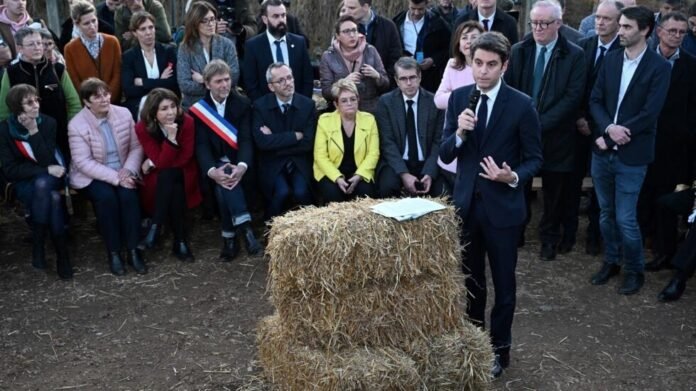
In a bid to address the growing unrest among French farmers, Prime Minister Gabriel Attal visited a cattle farm in the Haute-Garonne department in southwest France, a hotspot for recent protests.
Facing his first major crisis since taking office, Attal announced a series of measures to alleviate the concerns raised by farmers who have been staging widespread demonstrations, including roadblocks and tractor convoys.
The focal point of the discontent revolves around the rising cost of diesel fuel used for farming machinery, attributed to the phasing out of tax breaks on the fuel.
Addressing the issue head-on, Attal assured farmers that the government would “put an end” to the escalating fuel prices.
Additionally, an emergency fund would be established to assist cattle farmers in combating illnesses among their livestock, emphasizing that agriculture would be prioritized above all else.
The government’s swift response comes amid fears of discontent spreading ahead of the European Parliament elections, a crucial test for President Emmanuel Macron’s administration.
The recent protests saw around 55,000 people mobilizing, with major disruptions on motorways, tractor convoys in cities, and protests outside government buildings.
The farmers’ grievances include fuel hikes, perceived burdensome green regulations, and directives from the European Union.
Motorways were blocked, and in a symbolic act of defiance, protesters hung an effigy of a farmer from a mock gallows on the A10 motorway west of Paris.
Tractors and hay bales blocked the A1 motorway heading north from Paris, causing significant traffic jams. In the south, approximately 400 kilometres of the motorway between the Lyon region and the Spanish border were shut down.
“We don’t want any more words; we want acts,” declared Sebastien, a 21-year-old farmer participating in a blockade near Blagnac airport outside Toulouse.
The agriculture minister, Marc Fesneau, issued a warning to food manufacturers and supermarkets, stating that fines could be imposed if they failed to comply with laws on farmers’ pay.
Farmers have expressed frustration over squeezed purchase prices for their produce and complex environmental regulations.
The removal of a tax break on diesel for farm equipment was the tipping point for many, prompting calls for binding minimum prices, faster aid payouts, and a pause on pesticide use restrictions.
In response to the farmers’ demands, Attal announced plans to simplify administrative tasks for farmers and inject subsidies into organic farming.
Some of the 140 demands put forth by the farmers may require new legislation or challenging negotiations at the European Union level.
Demonstrators have drawn attention to contentious free trade agreements, particularly the ongoing deal with the South American bloc Mercosur.
Farmers argue that their non-EU competitors abroad do not face the same standards, especially regarding pesticide use.
While the protests have seen acts of civil disobedience, including the burning of a rural social insurance building in Narbonne, authorities have refrained from using force against the blockades and other forms of protest.
Despite the tensions, President Macron’s government remains cautious in its approach, mindful of the scars left by the 2018-19 “Yellow Vests” movement, which led to widespread clashes between demonstrators and police.
As the government takes steps to address the concerns of farmers, the nation watches closely, hoping for a resolution that will not only quell the immediate unrest but also pave the way for sustained cooperation between the agricultural sector and the government.
This article was created using automation technology and was thoroughly edited and fact-checked by one of our editorial staff members